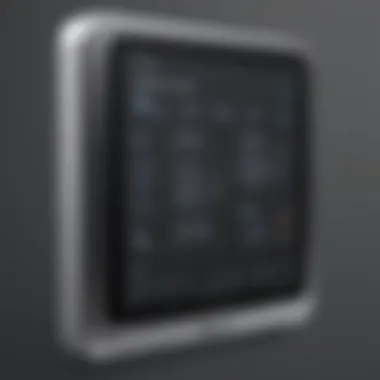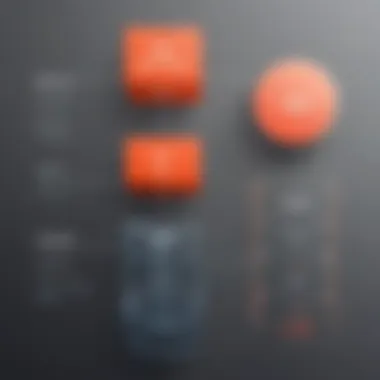Essential Guide to Hotel Property Management Systems


Intro
In the modern hospitality landscape, hotel property management systems (PMS) serve as a critical backbone for operations. They function as comprehensive platforms that facilitate various aspects of hotel management, ranging from front desk operations to housekeeping and beyond. Understanding PMS is crucial for small to medium-sized hotels aiming to improve efficiency and enhance guest experience.
Hotel PMS software has evolved significantly over recent years, driven by technological advancements and changing market demands. Operators no longer need to rely on traditional, manual processes. Instead, the availability of sophisticated PMS solutions enables properties to streamline their operations, analyze data, and ultimately provide better services to their guests.
Understanding the software landscape is essential for decision-makers in this domain. This article will delve into the specifics of hotel PMS, illuminating its purpose, key features, and the competitive landscape. With practical insights, hotel operators can navigate the complexities of PMS software, empowering them to make informed choices that align with their operational goals.
Software Overview
Purpose of the Software
Hotel property management systems are designed with a primary objective: to manage hotel operations efficiently. This includes reservation management, guest check-in and check-out processes, billing, and report generation. By centralizing these functions, PMS can help operators maintain a clear overview of their property’s activities and financial standings.
With an effective PMS, hotel staff can spend less time on administrative tasks and more time engaging with guests, which usually leads to improved guest satisfaction. Moreover, PMS systems integrate seamlessly with other technological solutions, such as booking engines and point-of-sale systems, further enhancing operational efficiency.
Key Features
The key features of hotel PMS are numerous, as they cater to various operational needs:
- Reservation Management: Automates booking processes, monitors availability, and minimizes the risk of overbooking.
- Front Desk Management: Streamlines guest check-in and check-out experiences with real-time updates.
- Billing and Invoicing: Facilitates accurate and timely invoices for guests, ensuring smooth financial transactions.
- Housekeeping Management: Assigns and tracks housekeeping tasks, ensuring rooms are serviced promptly.
- Reporting and Analytics: Provides insights into occupancy rates, revenue performance, and guest demographics to support strategic decision-making.
Incorporating these features into hotel operations paves the way for enhanced service delivery and operational efficiency.
Comparison with Competitors
Feature-by-Feature Analysis
When selecting a PMS, it is critical to conduct a thorough analysis of available options. Different software providers offer varying features that may cater to specific needs of different hotels. They can be categorized as follows:
- Cloud-Based vs. On-Premise: Choose between solutions hosted in the cloud, offering more flexibility, or traditional systems requiring local installations.
- Customization Options: Assess the extent to which the PMS can be tailored to fit unique operational requirements.
- User Experience: Evaluate how user-friendly the system is, as ease of use significantly impacts staff training and productivity.
- Integrations: Examine how well the PMS integrates with other hotel systems, including channel managers and loyalty programs.
Pricing Comparison
Pricing structures among PMS providers vary widely, impacting the budget planning for hotel operators. Here are common pricing models:
- Subscription-Based Pricing: Hotels pay a monthly fee, which usually include updates and support services.
- One-Time Purchase: Some PMS systems require a one-time upfront cost, although ongoing maintenance fees may apply.
- Per-Transaction Fees: Pricing might also involve paying based on the number of reservations or transactions processed.
"Choosing the right PMS can significantly impact a hotel's efficiency and guest satisfaction. An informed choice is essential."
Preamble to Hotel Property Management Systems
Hotel property management systems (PMS) have become essential tools in the hospitality sector. As hotels evolve to meet the demands of a tech-savvy clientele, PMS plays a pivotal role in streamlining operations. The significance of understanding these systems lies in their capacity to enhance several core functions within a hotel. From reservation management to billing processes, the benefits are substantial.
Definition of a Property Management System
A property management system is a software application designed to help manage the day-to-day operations of a hotel or similar establishment. It integrates various aspects of hotel management, including front desk operations, guest services, and billing. Modern PMS solutions also include functionality for managing reservations, keeping track of room availability, and handling guest communications. By centralizing these functions, the system increases efficiency and reduces the likelihood of human error.
Importance of PMS in the Hospitality Sector
The significance of PMS in the hospitality sector cannot be overstated. Here are several key reasons why PMS is crucial:
- Operational Efficiency: By automating routine tasks, PMS improves workflow. Staff can focus on guest services rather than administrative work.
- Improved Guest Experience: A seamless system leads to faster check-ins and check-outs. Guests appreciate convenience, which can enhance their overall satisfaction and loyalty.
- Data Management: PMS enables better data tracking and reporting. Hoteliers can analyze trends in guest behavior, occupancy rates, and revenue, allowing for more informed decisions.
- Increased Revenue Opportunities: By optimizing operations and guest experiences, hotels can increase their revenue through better pricing strategies and marketing efforts.
In summary, adopting a robust hotel property management system equips hospitality businesses with the tools necessary to adapt to changing market demands while maintaining high standards of service. Understanding the inner workings of these systems is essential for effective hotel management.
Core Features of Hotel PMS
The core features of a Hotel Property Management System (PMS) are essential. They create the backbone of daily operations. Understanding these features allows hotel operators to choose a system that aligns with their business goals. The PMS offers functionalities that streamline various processes in hospitality management. This results in enhanced efficiency, improved guest satisfaction, and better financial performance.
Reservation Management
Reservation management is one of the most critical functions of a PMS. It allows hotels to track bookings effortlessly. This feature handles various aspects of reservations, from online bookings to cancellation management. It can integrate with online travel agencies and your hotel’s own website.


Key benefits of this functionality include:
- Real-time availability: Prevents overbooking by showing accurate room status.
- Automated reminders: Sends information to guests about upcoming stays, thus reducing no-shows.
- Modification tools: Enables guests to change dates or room types with ease.
This promotes flexibility and enhances overall guest experience.
Front Desk Operations
Front desk operations functionality streamlines guest check-in and check-out processes. It plays a vital role in ensuring a smooth guest interaction with hotel staff. Quick access to guest information and preferences helps front desk staff to provide personalized services.
Important elements include:
- Guest Profiles: Maintains detailed records of guests for better service.
- Room Assignment: Efficiently allocates rooms based on guest preferences and availability.
- Check-in/Check-out efficiency: Reduces waiting times, enhancing guest satisfaction.
This feature aids in establishing a strong initial impression, which is crucial for guest retention.
Billing and Invoicing
Billing and invoicing within a PMS is integral to financial management. This feature manages all monetary transactions, from room charges to additional services like dining and spa usage. Clear invoicing leads to transparency and trust with guests.
Key considerations in this area are:
- Detailed invoices: Itemized billing for better clarity.
- Multiple payment options: Enhances convenience by supporting various payment methods.
- Automated reconciliation: Simplifies financial records and reduces errors.
Ensuring bills are accurate and easy to read can significantly improve the guest's experience.
Reporting and Analytics
Reporting and analytics are essential components of a PMS. They provide insights into operational performance and assist in strategic decision-making. These functionalities enable hotel operators to track key performance indicators such as occupancy rates and revenue per available room (RevPAR).
Benefits include:
- Data-driven decisions: Enables managers to make informed choices based on factual data.
- Customizable reports: Tailor reports to reflect specific interests or needs.
- Trend analysis: Identifies patterns in guest behavior and preferences.
Access to real-time data helps hoteliers adapt quickly to market changes and guest demands.
Types of Hotel Property Management Systems
Understanding the types of hotel property management systems is crucial for hotel operators aiming to optimize their operations. Different systems offer unique advantages, and knowing these can help in making informed decisions. This section delves into the main categories: cloud-based solutions and on-premises systems. Each of these options comes with its specific considerations and benefits, which can affect the overall efficiency and effectiveness of hotel management.
Cloud-Based PMS Solutions
Cloud-based property management systems have gained significant traction in recent years. These systems are hosted on remote servers and accessed via the internet. This model provides flexibility and convenience.
Some key benefits include:
- Accessibility: Users can access the system from anywhere with an internet connection. This is valuable for hotel managers who need to manage operations remotely.
- Cost-Effective: Typically, cloud-based systems require lower upfront investment compared to on-premises solutions. Payment is usually subscription-based, which can help in budget management.
- Scalability: As a hotel grows, cloud solutions can easily scale to accommodate more rooms, users, or services. This means that hotels can add features as needed without significant interruptions.
However, there are also factors to consider:
- Dependence on Internet Connectivity: A stable internet connection is crucial. Interruptions can hinder access to the system.
- Data Security Concerns: While many cloud providers invest in security, the nature of storing data remotely raises apprehensions for some hoteliers.
- Vendor Reliability: Choosing a reputable vendor is necessary to ensure consistent service and support.
On-Premises PMS Solutions
On-premises property management systems are installed locally on a hotel's own servers. This traditional approach offers different advantages that can align with specific hotel needs.
Key features of on-premises systems include:
- Control: Hotels have full control over their data. This is particularly important for those with strict compliance or security requirements.
- Customization: Many on-premises solutions offer greater customization options to fit the unique processes of a hotel. This means hoteliers can tailor features to suit their operations better.
- One-Time Cost: Although these systems may come with higher initial costs, they often do not carry ongoing subscription fees, leading to potential long-term savings.
Nonetheless, there are drawbacks:
- Higher Upfront Costs: The installation and setup can be financially demanding, especially for small to medium-sized establishments.
- Maintenance Requirements: Internal IT support may be necessary to manage updates, backups, and troubleshooting.
- Less Flexibility: Adapting to changes in business needs can be more challenging with on-premises systems compared to their cloud counterparts.
In summary, the decision between cloud-based and on-premises property management systems hinges on a hotel's specific requirements, budget, and operational preferences. Assessing the features and implications of each type can lead to a more tailored, effective, and efficient management approach.


Key Benefits of Implementing a PMS
Hotel property management systems (PMS) present several advantages that can fundamentally upgrade how a hotel operates. For small to medium-sized businesses, which often grapple with resource limitations, implementing a PMS can lead to substantial improvements in efficiency and guest satisfaction. Here, we will explore three primary benefits of adopting a PMS in your establishment.
Improved Operational Efficiency
One key benefit of hotel PMS is enhanced operational efficiency. The system automates many tedious tasks, freeing staff to focus more on direct guest interactions. For instance, reservation management becomes streamlined, minimizing the chances of overbookings or double bookings. The front desk operations can also be expedited; check-ins and check-outs can be completed rapidly, improving guest flow and reducing wait times.
Additionally, various functions such as housekeeping management and room assignment can be integrated into the PMS. This integration ensures that housekeeping teams are promptly informed of room statuses. Thus, delays are minimized. These elements combine to create a more organized and efficient hotel operation.
Enhanced Guest Experience
Beyond operational efficiency, a PMS greatly contributes to enhancing the overall guest experience. Modern travelers expect convenience and instantaneous service, factors that can significantly affect their satisfaction levels. With a PMS, hotels can personalize guest interactions. For example, guest profiles can store preferences, past stays, and notes on feedback. This information allows staff to tailor their service, from room preferences to special amenities.
Furthermore, effective PMS software can facilitate smooth communication between staff and guests. Guests may find it easier to make requests and receive prompt responses through integrated apps or portals.
"An enhanced guest experience leads to higher ratings and an increased likelihood of return visits."
Real-Time Data Access
Another important advantage of a PMS is real-time data access. In the hospitality industry, the ability to make informed, swift decisions is vital. A well-functioning PMS offers insights into various metrics, such as occupancy rates, revenue performance, and guests' preferences.
This access to data enables hotel managers to identify trends that may otherwise go unnoticed. For example, if certain types of rooms generate more interest during a specific season, management can adjust marketing strategies accordingly. Similarly, when data indicates a decline in guest satisfaction, immediate action can be taken to investigate and rectify the problem.
In summary, the key benefits of implementing a PMS consist of improved operational efficiency, enhanced guest experience, and real-time data access. These elements collectively contribute to a more viable and competitive hotel environment, supporting sustainable growth.
Factors to Consider When Choosing a PMS
Selecting the right Property Management System (PMS) is a critical step for any hotel operation. It can impact the overall efficiency, guest satisfaction, and financial performance of the establishment.
When choosing a PMS, several key elements must be considered to ensure it aligns with the unique needs of the hotel. Below are the main factors to evaluate:
Scalability and Flexibility
The scalability of a PMS is essential for future growth. As a hotel expands, the chosen system must be capable of handling increased bookings, additional staff, and more complex operations. A flexible PMS allows for customization, adapting to changes in the business model or guest expectations. Consideration should also be given to modular options where functionalities can be added or removed as necessary.
Integration with Other Software
The ability of a PMS to integrate with other platforms is crucial for seamless operations. A good PMS should connect effortlessly with tools such as channel managers, accounting software, and customer relationship management systems. This integration ensures that data flows smoothly across platforms, reducing manual input and the chances of errors. When evaluating PMS options, assess the available APIs and supported third-party integrations.
Cost vs. Features
Balancing the cost of a PMS with the features offered is a key consideration. While it can be tempting to select a low-cost option, it is important to evaluate what is included in the package. An economical PMS may lack essential functionalities that could lead to inefficiencies down the road. Conversely, an expensive system with features you do not need also presents challenges. Conducting a thorough cost-benefit analysis helps determine the right balance for your specific hotel needs.
"Choosing the right PMS is not just about what you pay today, but how much it can save you in the future through efficiency and better guest relations."
Top Hotel Property Management Systems
The landscape of hotel property management systems is broad and diverse. The right system can profoundly affect a hotel’s operations, efficiency, and guest satisfaction. Therefore, understanding which systems stand out in today's market is essential for hoteliers aiming to enhance their business.
When selecting a PMS, it is crucial to consider multiple factors such as usability, integrations, cost, and specific functionalities. Systems tailored for small to medium-sized hotels can vary significantly from those designed for large chains. Each option comes with unique benefits that can lead to improved operational flow and guest experiences.
Comparison of Hotel PMS Options
When it comes to choosing a property management system, small to medium-sized hotels face significant challenges. The comparison of hotel PMS options offers essential insights that can guide decision-makers in selecting the most effective system. It is crucial to consider distinct features and pricing models that different PMS solutions provide. Understanding these aspects not only aids in optimizing operations but also enhances guest experiences.
The primary elements to evaluate in this comparison involve features, integration capabilities, usability, and cost-effectiveness. This assessment allows hoteliers to identify the options best suited to their unique requirements. Furthermore, the right PMS can influence operational efficiency and guest satisfaction, making this comparison a pivotal step in the selection process.
Feature Comparison
In the competitive hospitality industry, the features offered by a PMS can significantly vary. A thorough feature comparison allows hotel operators to discern which system aligns with their operational needs. Common features to consider include:
- Reservation Management: This includes tools for handling bookings online, managing availability, and optimizing room allocations.
- Front Desk Operations: Efficient front desk functionalities enhance check-in and check-out processes, providing a seamless guest experience.
- Billing and Invoicing: A reliable PMS should facilitate accurate billing, invoicing, and payment processing, reducing errors and creating transparency.
- Reporting and Analytics: This feature is vital for generating insights on performance metrics, guest preferences, and trends that can inform strategic decisions.
By contrasting these key features, hotels can ensure they choose a PMS that not only meets basic operational requirements but also supports long-term growth and adaptability in a fast-evolving market.
Pricing Models Comparison


Evaluating the pricing models of various PMS options is just as critical as assessing their features. Different systems offer a range of payment structures, which can significantly impact the overall budget. Here are some common pricing models:
- Subscription-Based Pricing: Some systems operate on a monthly or annual subscription. This model often includes ongoing updates and customer support, providing clear costs but potentially higher long-term expenditure.
- One-Time Licensing Fees: This approach involves a substantial initial investment, providing ownership of the software. However, it can lead to higher maintenance costs in the long run.
- Pay-Per-Use: Certain PMS solutions implement a pay-per-use structure, where costs are associated with the actual usage of the system. This model may benefit smaller establishments with fluctuating occupancy rates.
Understanding these various pricing models can guide hotel managers in selecting a PMS that aligns with their financial strategies. A well-informed choice regarding pricing can lead to substantial savings and better resource allocation.
"Careful consideration of PMS options is foundational for optimizing hotel operations and enhancing the guest experience."
In sum, the comparison of hotel PMS options serves as an essential element of the selection process. It allows hotel operators to make data-driven decisions that can streamline operations and ultimately lead to improved guest satisfaction.
User Reviews and Case Studies
User reviews and case studies play a pivotal role in understanding the effectiveness of hotel property management systems. They serve as a practical measure of how these systems impact daily operations, guest interactions, and overall business performance. For small to medium-sized hotels, these insights can be especially valuable. The experiences shared by peers provide real-world evidence of the benefits and challenges that come with implementing a PMS.
User feedback highlights specific features that are most beneficial and allows potential users to gauge the software's real-life usability. Furthermore, these reviews frequently emphasize how well different PMS solutions integrate with existing operations, which is a significant consideration during the selection process. Case studies, on the other hand, illustrate success stories detailing actual implementations. They delve into metrics such as improved efficiency, cost savings, and enhanced guest satisfaction. By analyzing these examples, potential buyers can identify not only what systems work best but also what pitfalls to avoid.
Positive User Experiences
Several hoteliers have reported significant improvements after adopting specific PMS solutions. For instance, many users appreciate the automated booking and billing features. These streamline processes, reducing the manual effort required and minimizing errors. One user noted, "The reservation system reduced check-in times significantly. Guests are happier when they aren't left waiting."
Other positive aspects reported include enhanced data management capabilities. Hotel operators have mentioned that real-time access to analytics has transformed their decision-making. They can now create targeted marketing campaigns based on accurate data, leading to increased bookings.
- Quick adjustment of room prices based on occupancy data
- Ability to generate comprehensive reports effortlessly
- User-friendly interfaces that simplify staff training
These reviews show that the right PMS can lead to improved efficiency and higher guest satisfaction.
Challenges and Areas for Improvement
Despite the many advantages, user reviews also reveal notable challenges associated with hotel PMS implementations. Some users report that certain systems can be overly complex, leading to a steep learning curve for staff. A hotel manager commented, "Training staff took more time than we expected, which delayed our full utilization of the software."
Moreover, not all PMS solutions integrate seamlessly with third-party applications. Some users experience difficulties connecting their PMS to channel managers or revenue management tools. It can hamper their ability to manage bookings effectively across different platforms.
Users also express concerns about customer support. A reliable support system is critical for troubleshooting and ensuring smooth operations. If support is lacking, it can lead to frustration during critical times.
In summary, while user reviews and case studies provide valuable insight into the effects of a PMS, it is essential for potential buyers to consider both the successes and challenges noted by current users. This balanced view allows decision-makers to make informed choices, tailored to their unique needs.
Future Trends in Hotel PMS Technology
Understanding future trends in hotel property management systems (PMS) is essential for hoteliers seeking to remain competitive in an ever-evolving market. Technological advancements bring new capabilities and opportunities for enhancing operations and improving guest experiences. By keeping abreast of these trends, hotel management can make informed decisions about upgrading or adopting new systems, ensuring they align with current needs and future growth.
Adoption of Artificial Intelligence
The integration of artificial intelligence (AI) into hotel PMS is becoming increasingly significant. AI can streamline numerous tasks that traditionally required human intervention. For instance, chatbots can handle common inquiries, leaving staff free to focus on more complex guest needs. Additionally, AI-driven analytics offer insights into booking patterns and guest preferences. This data can be used to tailor marketing strategies and optimize pricing models, ultimately enhancing revenue.
Moreover, predictive analytics can improve demand forecasting, allowing hotels to adjust resources and pricing dynamically. However, implementing AI solutions should be approached thoughtfully. It is crucial to assess whether the technology aligns well with existing systems and if staff are adequately trained to utilize AI tools effectively.
Increased Focus on Data Security
As PMS systems increasingly rely on cloud-based solutions and collect vast amounts of sensitive information, the focus on data security has intensified. Cybersecurity threats are a significant concern for hotels, as data breaches can result in financial loss and damage to reputation. Therefore, ensuring that PMS providers implement robust security measures is critical.
Consideration of data security must include compliance with relevant regulations, such as the General Data Protection Regulation (GDPR). This regulation requires that personal data is processed lawfully, transparently, and securely. Adopting PMS solutions that prioritize security not only protects guest information but also builds trust and enhances the overall credibility of the hotel.
"In the hospitality industry, technology is not just an option; it is a necessity for competitiveness and security.”
By understanding and implementing these advancements, hotel operators can better position themselves in a dynamic landscape.
Closure
In closing, the topic of hotel property management systems (PMS) carries significant importance in the hospitality industry. This article functioned to provide an intricate view into how PMS software can be pivotal in the day-to-day operations of any hotel. Understanding the complexities and advantages of this technology is essential for hoteliers striving to enhance operational efficiency while ensuring guest satisfaction.
Summary of Key Insights
There are key insights that emerge from our discussion on PMS. First, the integration of a property management system facilitates streamlined operations across reservations, front desk management, and billing processes. These functions not only reduce errors but also improve the overall efficiency of hotel staff. Moreover, PMS provides real-time data access, enabling better decision-making through informed strategies. With the shift towards cloud-based solutions, scalability and adaptability of such systems have increased, allowing hotels to grow without significantly altering their operational frameworks.
Recommendations for Hoteliers
For hoteliers contemplating the implementation or upgrade of a PMS, a few recommendations stand out:
- Assess specific needs: Hoteliers should evaluate their unique requirements and how these align with the features offered by different PMS options.
- Consider user-friendliness: A system that is complicated to navigate can hinder staff productivity. Thus, ease of use must be a priority in evaluation.
- Prioritize integration capabilities: Look for solutions that can easily integrate with existing software like booking engines and revenue management systems.
- Evaluate total cost of ownership: Understand the pricing structure, including any hidden fees associated with scaling or support, to ensure the system fits within budgetary constraints.
Ultimately, understanding and choosing the right hotel property management system is not just a technological decision. It is a strategic choice that can determine how well a hotel meets guest expectations and operates efficiently in an increasingly competitive market.



